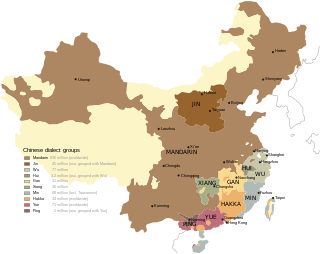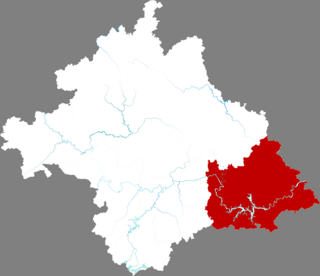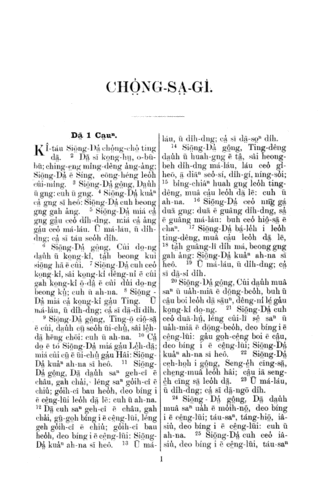Pinghua refers to two Sinitic languages from Guangxi and Hunan, China.
Pinghua may also refer to:
Pinghua refers to two Sinitic languages from Guangxi and Hunan, China.
Pinghua may also refer to:
Cí, also known as chángduǎnjù and shīyú, is a type of lyric poetry in the tradition of Classical Chinese poetry that also draws upon folk traditions. Cí, also known as "song lyrics," use various poetic meters derived from a base set of fixed pattern forms, using fixed-rhythm, fixed-tone, and line-lengths varying according that of the model examples. The rhythmic and tonal pattern of the cí are based upon certain, definitive musical song tunes (cípái), and in many cases the name of the musical tune is given in the title of a cí piece, in a form such as "after ...."

Pinghua refers to various Sinitic language varieties spoken mainly in parts of Guangxi, with some speakers in Hunan. Pinghua is a trade language in some areas of Guangxi, spoken as a second language by speakers of Zhuang languages. Some speakers are officially classified as Zhuang, and many are genetically distinct from most other Han Chinese. The northern subgroup is centered on Guilin and the southern subgroup around Nanning. The Southern dialect has several notable features such as having four distinct checked tones, and using various loanwords from the Zhuang languages, such as the final particle wei for imperative sentences.

The Standard Chinese pronunciation of surname Mo is pronounced in Standard Chinese as "Mò", in Cantonese as "Mok6". The surname is often romanized as Mok where Cantonese speakers are prominent. According to a study of Mu Ying's Name record, the surname came to be when descendants of the antediluvian ruler Zhuanxu abbreviated the name of his city, Moyangcheng (莫陽城) and took it as their surname.

The Fuzhou dialect, also Foochow, Hokchew, Hok-chiu, or Fuzhounese, is the prestige variety of the Eastern Min branch of Min Chinese spoken mainly in the Mindong region of Eastern Fujian Province. As it is mutually unintelligible to neighbouring varieties in the province, under a technical linguistic definition Fuzhou is a language and not a dialect. Thus, while Fuzhou may be commonly referred to as a 'dialect' by laypersons, this is colloquial usage and not recognised in academic linguistics. Like many other varieties of Chinese, the Fuzhou dialect is dominated by monosyllabic morphemes that carry lexical tones, and has a mainly analytic syntax. While the Eastern Min branch it belongs to is relatively closer to other branches of Min such as Southern Min or Pu-Xian Min than to other Sinitic branches such as Mandarin, Wu Chinese or Hakka, they are still not mutually intelligible.
Changping or Chang Ping, may refer to:

The Sinitic languages, often synonymous with the Chinese languages, are a group of East Asian analytic languages that constitute a major branch of the Sino-Tibetan language family. It is frequently proposed that there is a primary split between the Sinitic languages and the rest of the family. This view is rejected by a number of researchers but has found phylogenetic support among others. The Macro-Bai languages, whose classification is difficult, may be an offshoot of Old Chinese and thus Sinitic; otherwise Sinitic is defined only by the many varieties of Chinese unified by a shared historical background, and usage of the term "Sinitic" may reflect the linguistic view that Chinese constitutes a family of distinct languages, rather than variants of a single language.

Bàng-uâ-cê or Fuzhou romanization (福州話羅馬字), is a Latin alphabet for the Fuzhou dialect of Eastern Min adopted in the middle of the 19th century by Western missionaries. It had varied at different times, and became standardized in the 1890s. Bàng-uâ-cê was mainly used inside of church circles, and was taught in some mission schools in Fuzhou. However, unlike its counterpart Pe̍h-ōe-jī for Hokkien, even in its prime days Bàng-uâ-cê was by no means universally understood by Christians.
The Politics of Hunan Province in the People's Republic of China is structured in a dual party-government system like all other governing institutions in mainland China.

Hengzhou, formerly, Heng County or Hengxian is a county-level city of Guangxi Zhuang Autonomous Region, China; it is under the administration of the prefecture-level city of Nanning, the capital of Guangxi, with a permanent population of 863,001 and a hukou population of 1,200,521 as of the 2010 Census. The easternmost county-level division of Nanning City, it borders the prefecture-level cities of Guigang to the northeast, Yulin to the east, and Qinzhou to the south. 60% speak Pinghua as their mother tongue and a further 30% speak Pingua as a second language. The county-level city was approved and elevated by the former Heng County by the State Council on February 3, 2021.

Younuo is a divergent Hmongic language spoken in Longsheng Various Nationalities Autonomous County, Guangxi, China. Mao (2007:129) reports a total of approximately 4,000 speakers.

Old Xiang, also known as Lou-Shao, is a conservative Xiang Chinese language. It is spoken in the central areas of Hunan where it has been to some extent isolated from the neighboring Chinese languages, Southwestern Mandarin and Gan languages, and it retains the voiced plosives of Middle Chinese, which are otherwise only preserved in Wu languages like Shanghainese. See Shuangfeng dialect for details. Mao Zedong was a speaker of Old Xiang with his native Shaoshan dialect.

The Qin–Lian language is a southern branch of Yue Chinese spoken in the coastal part of Guangxi, including 3 main cities: Beihai, Qinzhou, Fangchenggang, and four subject counties: Hepu, Pubei, Lingshan, Dongxing.
A huaben is a Chinese short- or medium-length story or novella written mostly in vernacular language, sometimes including simple classical language. In contrast to the full-length Chinese novel, it is generally not divided into chapters and recounts a limited number of characters or events. The earliest huaben are reported in the 12th century during the Song dynasty, but the genre did not flourish until the late Ming dynasty, and after the mid-17th century did not produce works of originality. In the development of Chinese fiction, the huaben are heirs of the bianwen and chuanqi of the Tang dynasty, and are the predecessors of the stories and full-length novels of the Ming.
Tanci is a narrative form of song in China that alternates between verse and prose. The literal name "plucking rhymes" refers to the singing of verse portions to a pipa. A tanci is usually seven words long. On some occasions the length is ten words. Some scholars refer to tanci as "plucking rhymes," "southern singing narrative," "story-sining," "strum lyrics". The local forms of Tanci encompasses Suzhou Tanci, Yangzhou Tanci, Siming Nanci, Shaoxing Pinghudiao, etc.

Ping is the Mandarin pinyin romanization of the Chinese surname written 平 in Chinese character. It is romanized P'ing in Wade–Giles. Ping is listed 95th in the Song dynasty classic text Hundred Family Surnames. It is not among the 300 most common surnames in China in 2008.

Hinghwa Romanized, also known as Hing-hua̍ báⁿ-uā-ci̍ (興化平話字) or Báⁿ-uā-ci̍ (平話字), is a Latin alphabet of the Putian dialect of Pu-Xian Chinese. It was invented by William N. Brewster (蒲魯士), an American Methodist pioneer missionary in Hinghwa in 1890.
The Tongdao Pinghua is a variety of Guibei Pinghua (桂北平话) influenced by Kam (Dong). It is spoken by about 25,000 people in Tongdao Dong Autonomous County, Hunan, China.
Zhang Pinghua, born to a Hakka family in Yanling County, Hunan, China, was a Chinese politician. His former name was Zhang Chucai. He joined the Chinese Communist Party in November 1927. He took part in the Northern Expedition and the "Long March" of the Chinese Workers' and Peasants' Red Army.

The Matsu dialect is the local dialect of Matsu Islands, Taiwan. Native speakers also call it Bàng-huâ (平話), meaning the language spoken in everyday life. It is recognised as one of the statutory languages for public transport announcements in Lienchiang County, Taiwan.